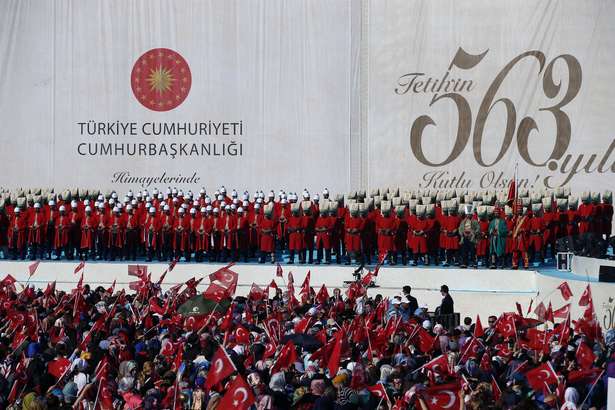On the 29th May, Turkey marked the 1453 Ottoman conquest of Istanbul on its 563rd anniversary with a grandiose ceremony including the participation of President Recep Tayyip Erdoğan and Prime Minister Binali Yıldırım, alongside an estimated million spectators, in the city’s coastal Yenikapı Square.
Thousands of people waving Turkish flags and cheering to Ottoman military music thronged the shores in memory of the opening of Constantinople by Sultan Muhammad al Fatih.
Turkey’s President Recep Tayyip Erdoğan Sunday described the Syrian regime, the terrorist group Daesh, and the terrorist PKK-linked PYD as a trio which “constantly supports and paves the way for one other”.
“Unfortunately, the countries we see as allies overlook this dirty game, [and] even support it,” Erdoğan said. “Those who use Daesh and drench Syria in blood, and likewise those who use the PYD and try to surround our southern borders, have one goal in common: namely, to sever all of Turkey’s ties with the Middle East and North Africa.”
Comment:
Such an event has once again ignited pride and hope in Muslims around the world, who view Turkey and its government as a state on the side of the Ummah and one that holds onto its Islamic history and values. However, this could not be further from the truth.
Only this week, did Turkey’s foreign minister Mevlut Cavusoglu suggest that the US and Turkey should work together to take on ISIS, arguing that they could easily advance in to Raqqah, the groups stronghold and work towards sealing the Turkish-Syria border. Turkey is willing to go further in aiding their Western allies, although they criticise the cooperation between the U.S. forces and the terrorist PKK group’s Syrian affiliate, the PYD, and strongly advocate for them to be recognised as such.
Nevertheless, in order to secure their national interests, Turkey is willing to go to any extent, especially given the recent ISIS terrorist attacks in the country.
Turkey is not in an easy position, facing the Russia supported PKK, ISIS and the West, however their years of collaboration with the West have been one of the primary causes for their current situation. Their aid flows and military compliance with the US and their desire to be accepted in the EU community, has driven them to prove that their seemingly Islamist affiliations will not otherwise impact their political ties.
And yet we see that the Western media and politicians are still not satisfied with the actions of the Turkish government, continually citing the rising Islamic sentiment and the recognition of the PKK as a terrorist group, as evidence of its authoritarian stance. In recent years the media has almost gone as far as considering Turkey as an Islamist state, which has only furthered the Turkish government’s attempts to prove themselves as a liberal Islamic model, abandoning Islam in the process.
It is for this reason that many Muslims choose to side with Erdogan’s AKP party, arguing that they are working towards some change and are a threat to the West, and so must be supported.
Nevertheless, it must be recognised that Turkey only acts for the sake of its own interests, and not upon the basis of Islam. With the majority of their population being Muslims, it is only natural to lift some of the restrictions Kemalism had previously imposed, such as the ban on hijab that was repealed in 2013. However this is not done for the sake of Islam, but rather under the justification of freedom, the cornerstone of every democracy, which Turkey now considers itself. The Islamic sentiments of the Muslims are being channelled towards nationalism and pride in the Turkish state, as opposed to any long term desire for the re-emergence of Islam. Moreover, their wider policies show that any future form of Islamic government or education is not their priority, but rather it is securing the sovereignty of the Turkish state, and proving themselves as part of the global North.
It is ironic that in celebrating the opening of Istanbul, the Turkish state reinforces the fact that its direction today could not be further from that of Sultan Muhammad al Fatih. Sultan Muhammad desired only to fulfil the prophecy of Rasoolallah ﷺ; that Constantinople would be opened by the best of commanders. He renamed the city “Islambul”, city of Islam and declared it a victory for all Muslims. Most importantly he ruled over the city with Islam, as he did with the rest of the Uthmani Khilafah.
What would he think if he looked upon Turkey today? The thousands waving Turkish flags and Erdogan’s pledge that those lands in Turkey will remain under the state, show that Istanbul is no longer a Muslim city, it is a Turkish city.
The Ummah should not be distracted by such historical displays and mistake them for the Islamic indications for the future. Nor should the Ummah be caught up in awe of individual leaders, but rather judge the government on the policies they pass. Turkey is happy to leave its Islamic history in the past, and aims in the future to be recognised in the international community only as a liberal Western model.
Aisha Hasan

